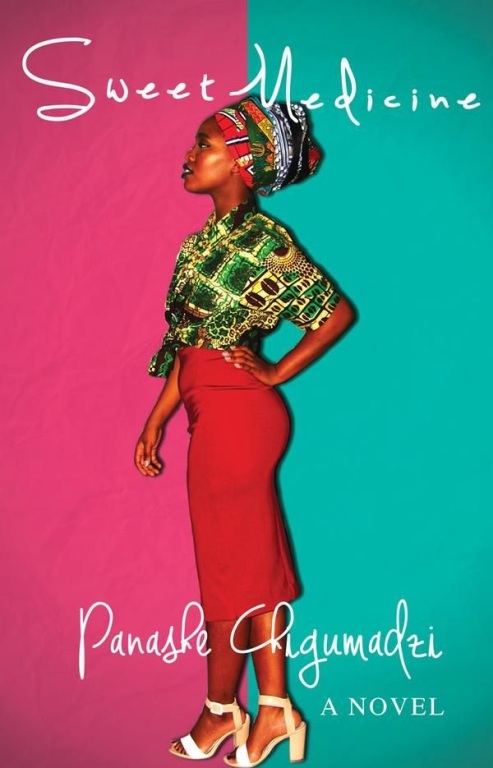BOOK REVIEW: Sweet Medicine
by Edward Tsumele,
2015-11-20 05:53:07.0
AT FACE value, Sweet Medicine, is a simple story about a graduate student finding herself in a tedious administrative job in a Zimbabwean government ministry.
But this debut novel by Ruth First fellow Panashe Chigumadzi has a political undercurrent that reflects the Zimbabwean political situation.
It is set against the backdrop of economical upheavals in Zimbabwe in the 2000s — the high inflation that rendered the Zimbabwean dollar useless, with industries closing down, and the economy shrinking, sending unemployed people onto the streets of Harare and other major cities to eke out a living as hustlers, hawkers and illegal foreign currency dealers.
Having studied economics at university, Tsitsi has high hopes of working for the Reserve Bank of Zimbabwe in an important position. Instead, she finds herself hopeless, facing an uncertain and boring future working as a personal assistant to a minister, Mr Zvobgo.
But then a girl has to do what she needs to do about her situation to secure a comfortable future. Tsitsi seduces the minister, who kicks out his wife in favour of the young lady.
Chigumadzi is a wordsmith, carefully sketching the lives of a people caught in the grip of an economic meltdown.
Sweet Medicine captures all the little things that define a depressed economy without being simplistic and didactive.
She deals beautifully with the complexities surrounding people’s lives, caught up as her characters are, in a political and economic maelstrom over which they have little or no control.
The reader is able to see the challenges the people face by following the characters in the book. For example, Tsitsi and her friend, Chiedza, are using their bodies to navigate the delicate economic situation, as they lure the politically connected, such as Zvobgo, into loveless relationships so they can access economic benefits.
In Tsitsi’s case, it becomes obvious she is in control — Zvobgo comes to support not only her, but her unemployed mother and an unemployed uncle.
"I wanted to tell the complex story of the Zimbabwean situation through the eyes of characters like Tsitsi. Many books have been written about the Zimbabwean situation, but a lot of the books tended to tell this complex story, using the country itself as the main character, and not through ordinary people like Tsitsi. Unfortunately, such approaches tend to be didactive," says Chigumadzi in an interview.
Having left Zimbabwe for SA when she was three years old, she calls both counties home.
Chigumadzi recently caused a stir when she penned a controversial paper that she presented as a Ruth First fellow, in which she looked closely at the subject of the so-called "born frees" — a generation of youth that was born after 1994’s first democratic elections and who are often wrongly assumed to be apolitical. Among them are those who are sometimes derogatorily called "coconuts" (black on the outside, white on the inside) having attended mainly private schools and former Model C schools.
"I think it was good that I got the Ruth First fellowship at a time when young people are now asserting themselves at universities around the country. This is our time," says Chigumadzi.
• Sweet Medicine will be launched at Cape Town’s Book Lounge today, and in New York in December, Johannesburg in February and Harare in March

Picture: THINKSTOCK
AT FACE value, Sweet Medicine, is a simple story about a graduate student finding herself in a tedious administrative job in a Zimbabwean government ministry.
But this debut novel by Ruth First fellow Panashe Chigumadzi has a political undercurrent that reflects the Zimbabwean political situation.
It is set against the backdrop of economical upheavals in Zimbabwe in the 2000s — the high inflation that rendered the Zimbabwean dollar useless, with industries closing down, and the economy shrinking, sending unemployed people onto the streets of Harare and other major cities to eke out a living as hustlers, hawkers and illegal foreign currency dealers.
Having studied economics at university, Tsitsi has high hopes of working for the Reserve Bank of Zimbabwe in an important position. Instead, she finds herself hopeless, facing an uncertain and boring future working as a personal assistant to a minister, Mr Zvobgo.
But then a girl has to do what she needs to do about her situation to secure a comfortable future. Tsitsi seduces the minister, who kicks out his wife in favour of the young lady.
Chigumadzi is a wordsmith, carefully sketching the lives of a people caught in the grip of an economic meltdown.
Sweet Medicine captures all the little things that define a depressed economy without being simplistic and didactive.
She deals beautifully with the complexities surrounding people’s lives, caught up as her characters are, in a political and economic maelstrom over which they have little or no control.
The reader is able to see the challenges the people face by following the characters in the book. For example, Tsitsi and her friend, Chiedza, are using their bodies to navigate the delicate economic situation, as they lure the politically connected, such as Zvobgo, into loveless relationships so they can access economic benefits.
In Tsitsi’s case, it becomes obvious she is in control — Zvobgo comes to support not only her, but her unemployed mother and an unemployed uncle.
"I wanted to tell the complex story of the Zimbabwean situation through the eyes of characters like Tsitsi. Many books have been written about the Zimbabwean situation, but a lot of the books tended to tell this complex story, using the country itself as the main character, and not through ordinary people like Tsitsi. Unfortunately, such approaches tend to be didactive," says Chigumadzi in an interview.
Having left Zimbabwe for SA when she was three years old, she calls both counties home.
Chigumadzi recently caused a stir when she penned a controversial paper that she presented as a Ruth First fellow, in which she looked closely at the subject of the so-called "born frees" — a generation of youth that was born after 1994’s first democratic elections and who are often wrongly assumed to be apolitical. Among them are those who are sometimes derogatorily called "coconuts" (black on the outside, white on the inside) having attended mainly private schools and former Model C schools.
"I think it was good that I got the Ruth First fellowship at a time when young people are now asserting themselves at universities around the country. This is our time," says Chigumadzi.
• Sweet Medicine will be launched at Cape Town’s Book Lounge today, and in New York in December, Johannesburg in February and Harare in March





















Change: 0.95%
Change: 1.07%
Change: 0.81%
Change: 0.88%
Change: 1.95%
Data supplied by Profile Data
Change: 0.00%
Change: 0.00%
Change: 0.95%
Change: 0.00%
Change: 0.00%
Data supplied by Profile Data
Change: 0.02%
Change: 0.00%
Change: -0.27%
Change: -0.08%
Change: 0.00%
Data supplied by Profile Data
Change: 0.00%
Change: 0.00%
Change: 0.00%
Change: 0.00%
Change: 0.00%
Data supplied by Profile Data